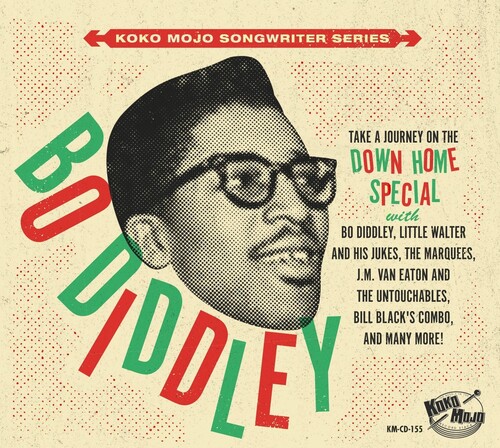Show results for
Explore
In Stock
Artists
Actors
Authors
Format
Theme
Category
Genre
Rated
Label
Specialty
Decades
Size
Color
Deals
- 4K Ultra HD Sale
- 50s Films Sale
- Action Sale
- Alternative Rock Sale
- Anime sale
- Award Winners Sale
- Bear Family Sale
- Blu ray Sale
- Blues on Sale
- British Sale
- Christmas in July
- Classical Music Sale
- Comedy Music Sale
- Comedy Sale
- Country Sale
- Criterion Sale
- Electronic Music sale
- Folk Music Sale
- Horror Sci fi Sale
- Kids and Family Sale
- Metal Sale
- Music Video Sale
- Musicals on Sale
- Mystery Sale
- Naxos Label Sale
- Page to Screen Sale
- Paramount Sale
- Rap and Hip Hop Sale
- Reggae Sale
- Rock
- Rock and Pop Sale
- Rock Legends
- Soul Music Sale
- TV Sale
- Vinyl on Sale
- War Films and Westerns on Sale

Koko Mojo Writer Series Bo Diddley: Down Home Special (Various Artists)
- Artist: Various Artists
- Format: CD
- Release Date: 5/6/2022

Koko Mojo Writer Series Bo Diddley: Down Home Special (Various Artists)
- Artist: Various Artists
- Format: CD
- Release Date: 5/6/2022
- Artist: Various Artists
- Label: Koko-Mojo
- UPC: 4260072729704
- Item #: 2481564X
- Genre: Pop
- Release Date: 5/6/2022

Product Notes
The focus is upon Ellas Otha Bates McDaniel who is better known as Bo Diddley. Down Home Special looks at the impact of his recordings, his song writing and production skills. Diddley's recordings were infused with waves of tremolo guitar, and African beats albeit with a blues sound. The "diddley beat" is essentially the clave rhythm, one of the most common bell patterns found in sub-Saharan African music traditions, with a " bom, bom, bom, bom, bom..." back-beat. The synoptic 5/4 rhythm pattern approach can be heard throughout his recordings and the pattern became synonymous with his style. The musical exploration takes in the years 1955 through to 1963. Bo Diddley is featured with a cross sample of his career and we use songs he composed which were issued as singles or album tracks. The throbbing rhythm & blues recordings include; his classic Bo Diddley, Who Do You Love?, Dearest Darling, Run Diddley Daddy, the autobiographical Story Of Bo Diddley, and many more. Diddley is the guitarist supporting Little Walter and His Jukes for Roller Coaster, and the album delves into his orchestration and musician skills for Billy Stewart, The Schoolboys, and The Marquees who have in their line-up future soul music sensations Marvin Gaye. The oddments are Mickey and Sylvia, Dearest, which Diddley never recorded and Love Is Strange, a song credited to Ethel Smith, but written by Bo Diddley, which is performed by Dale and Grace Of the rest; Don Stacey covers Say Man, The Johnny Otis Show work up The New Bo Diddley, two legends from Memphis J.M. Van Eaton, and Bill Black add instrumental flair with Bo Diddley and Hey Bo Diddley respectively, and English rockers Johnny Kidd and The Pirates performs I Can Tell. Freddy Koenig with The Jades close the twenty-song album with Road Runner. The group resided in a German-settled area of Texas which explains the Bavarian instrumentation used on the recording
Credits
-
Artist(s)Various Artists

